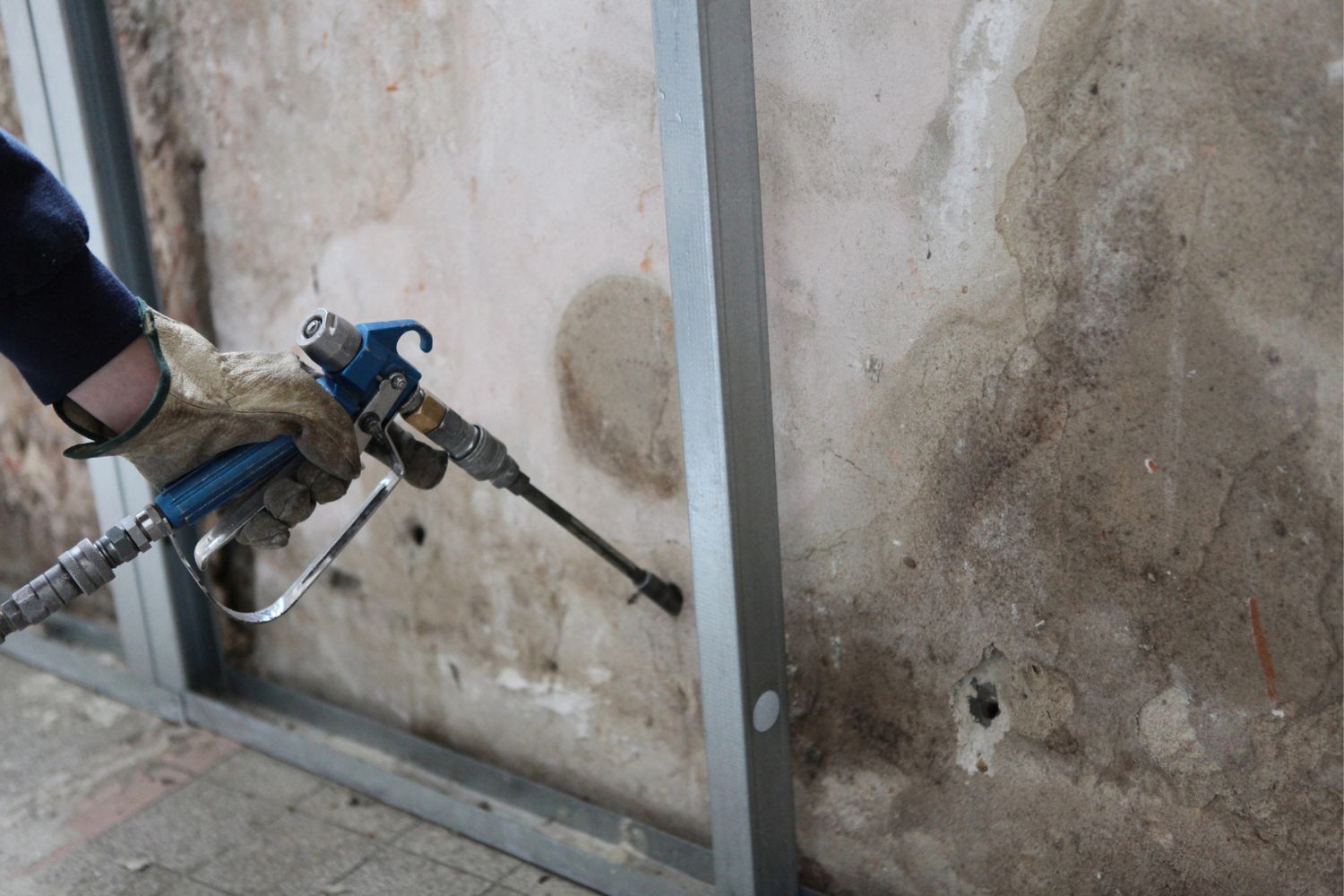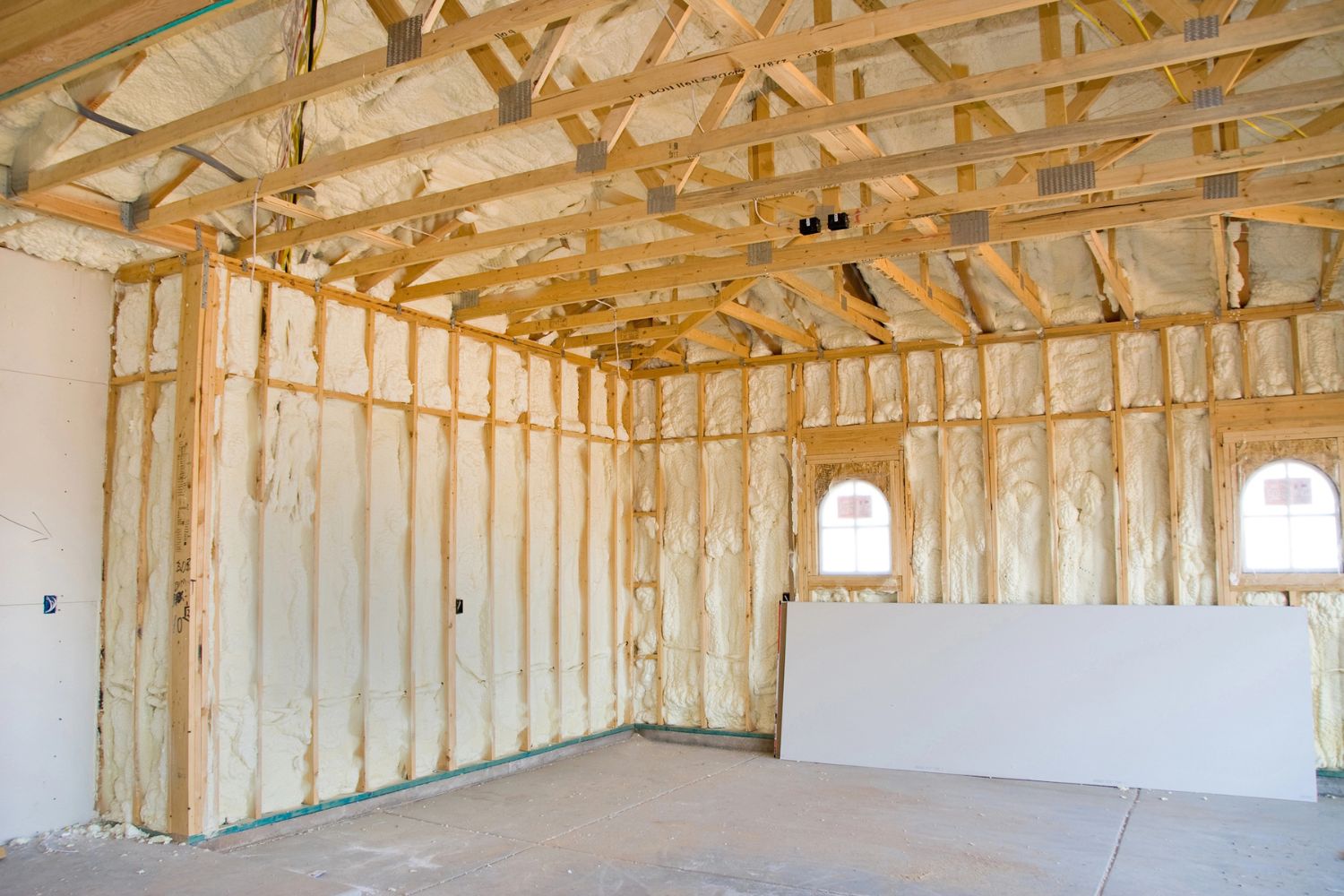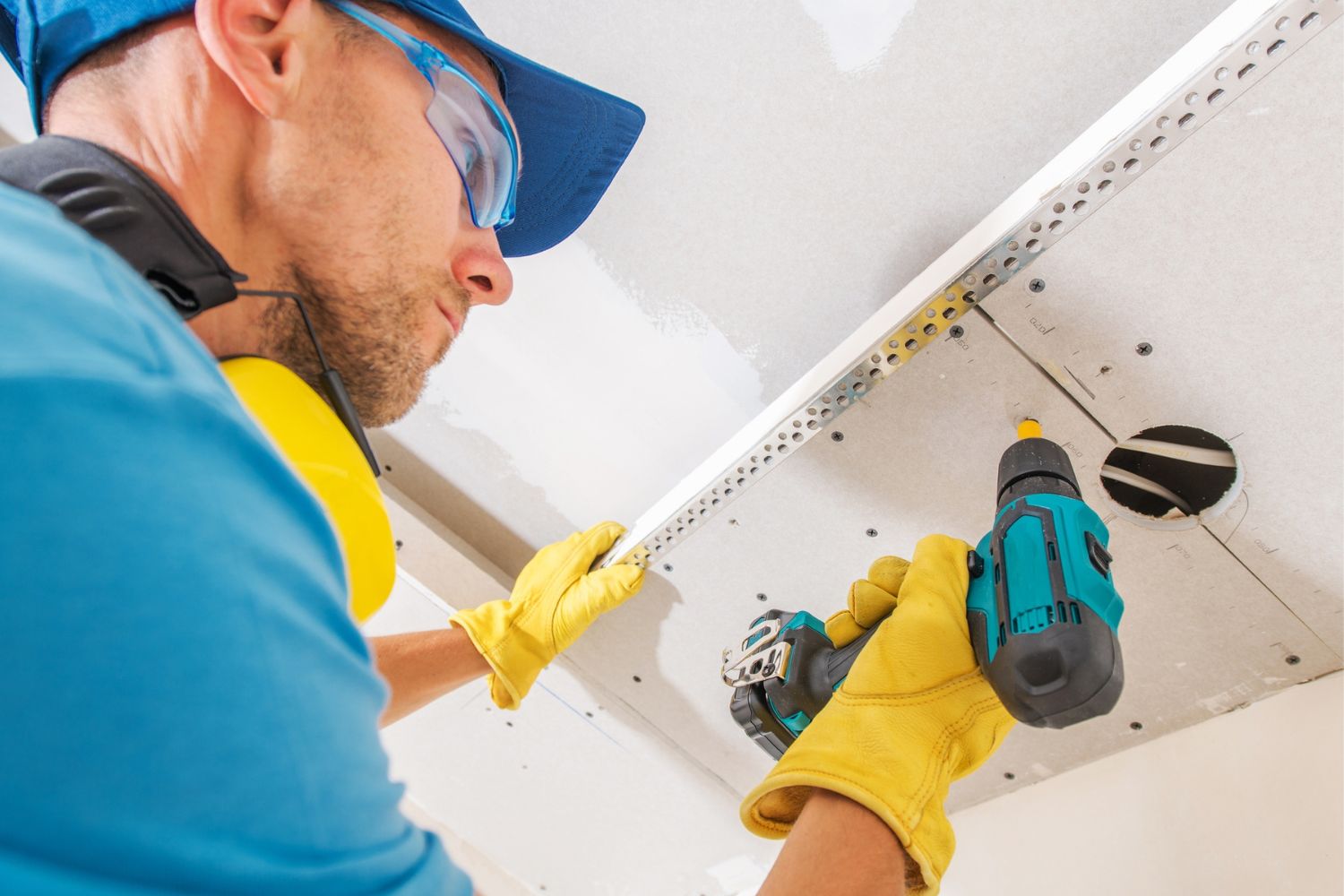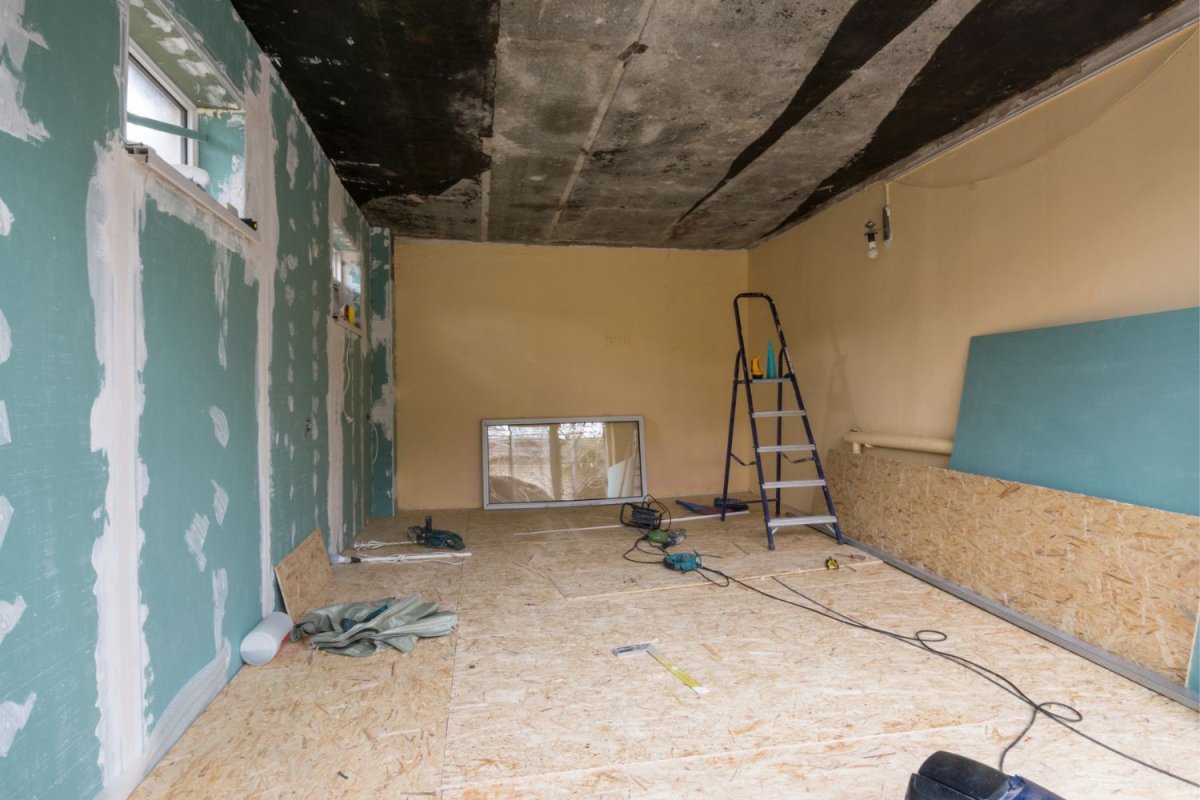We may earn revenue from the products available on this page and participate in affiliate programs. Learn More ›
Highlights
- The typical cost range to drywall a garage is between $360 and $1,700, with a national average cost of $1,100.
- The exact cost of drywalling a garage will depend on factors such as the size, shape, and features of the garage; the drywall type and thickness; the finish level; and the cost of labor.
- The benefits of drywalling a garage include improved protection against fire, reduced noise infiltration, and a potentially higher resale value.
- Homeowners may be able to DIY this project themselves, especially if it’s straightforward and the homeowner has experience working with drywall. However, those without experience or who have an extensive project area may be better off hiring a pro.
There are several reasons a homeowner may choose to add drywall to their garage. Drywall can help insulate and offer fire resistance and soundproofing, as well as provide protection against moisture. Some homeowners may also choose to drywall their garage to give it more of a finished appearance. This may be a necessary step if they’re converting the garage into an accessory dwelling unit, and it might also appeal to potential home buyers. Homeowners and drywall contractors sometimes say they’re installing Sheetrock and use the term interchangeably with drywall. Sheetrock is a brand of drywall, and it’s made from pressed gypsum between two sheets of durable paper.
According to Angi, the average cost to drywall a garage is between $360 and $1,700, with a national average of $1,100. Many factors can contribute to cost variations, including the size of the garage, materials, drywall thickness, and the existing garage features. There are other related costs, such as labor, tools, and products, that may also need to be considered.

Key Cost Factors
Similar to other home improvement projects, various factors go into calculating the cost of drywalling the walls and ceiling of a garage. These may include garage size, shape, and features; drywall type and thickness; finish level; and the cost of labor.
Garage Size
The size of the garage is one of the biggest factors in the cost to install drywall. Generally speaking, the bigger the garage, the more drywall it will need. The cost to install drywall varies between $1.50 and $3.50 per square foot, including labor.
Homeowners can expect to pay between $360 and $1,350 for a single-car garage measuring between 240 and 380 square feet. A 2-car garage, measuring 360 to 480 square feet, will cost between $540 and $1,700, while the average cost to install drywall in a 700- to 860-square-foot 3-car garage ranges from $1,050 to $3,000.
| Garage Size | Average Cost (Materials and Labor) |
| 1-car garage | $360 to $1,350 |
| 2-car garage | $540 to $1,700 |
| 3-car garage | $1,050 to $3,000 |
Garage Shape and Features
Not all garages have the same shape or features. Square or rectangular garages with no windows and minimal features have the lowest cost to drywall. Installing drywall in such garages involves minimal cutting, and the standard 4-foot-by-8-foot panels will work. Installation costs more for garages with corners, windows, doors, ceiling cutouts, and higher walls, as these features often complicate the project. Additionally, garages with these attributes may require more time, customization, and drywall panels.
Drywall Type and Thickness
Standard drywall is the most affordable type, but there are more expensive options. Homeowners can find types of drywall that are resistant to moisture, mold, and fire. There are also thicker panels that offer soundproofing, and eco-friendly panels are available that are made from recycled materials. Fire-resistant panels are often recommended for garages, and sometimes even required by building codes in a garage if it shares a wall or ceiling with the home.
Drywall also comes in different levels of thickness. Thicker drywall is more expensive and best for soundproofing, while thinner drywall costs less and is better for repairing existing drywall.
Most drywall panels are ¼-inch, ⅜-inch, ½-inch, ⅝-inch or ¾-inch thick. Basic ¼-inch-thick drywall costs around $10 to $12 per panel and up to $75 for ⅝-inch thick panels. Standard drywall is ½-inch thick, while ⅝-inch-thick drywall offers better fire resistance.
Finish Level
Drywall finishing is the final step in installing drywall and has five finishing levels, from level 0 to level 5.
Level 0 drywall is screwed into studs and there’s no mudding or taping. Level 1 involves mudding and taping the seams. Level 2 is the standard garage drywall finishing level and requires joints and interior angles to have drywall tape embedded in the joint compound. Level 3 adds a complete coat of joint compound and sanding. Level 4 drywall is sanded and primed, but it may have imperfections. Level 5 has no imperfections and includes a smooth coat of joint compound over the wall along with primer and sanding.
| Finish Level | Average Cost per Square Foot (Labor Only) |
| Level 0 | $0.30 to $0.80 |
| Level 1 | $0.70 to $1.50 |
| Level 2 | $0.80 to $1.75 |
| Level 3 | $0.90 to $2.50 |
| Level 4 | $1 to $3 |
| Level 5 | $1.15 to $3.50 |
Labor
Depending on the scope of the project, hiring a qualified drywall hanger may be the best option rather than DIY. The overall cost of labor depends on the square footage of a garage. A homeowner will also need to purchase supplies, including joint compound and drywall tape. Hiring a professional to hang and finish drywall costs between $1.20 and $3 per square foot, or $50 to $100 per hour, in addition to the drywall materials. Labor accounts for 15 percent to 25 percent of the total cost of the project.

Additional Costs and Considerations
There are several additional factors for homeowners to consider when calculating the total cost of drywall installation in the garage. If the space already has drywall installed but it needs to be replaced or repaired, the overall cost will increase. Additionally, drywall texturing may add to the final price. Some products may also require expert installation or permits, both of which come at a cost.
Existing Drywall Removal
Homeowners will need to account for the cost of drywall removal if they have existing drywall in the garage. This involves more than simply removing panels and requires caution. One of the most important things for homeowners to keep in mind when removing drywall is to avoid hitting electrical wires, plumbing, and other home systems in the wall. Repairing damage to these components may add significantly to the cost. Drywall removal costs $0.30 to $0.45 per square foot. For a standard 2-car garage, homeowners can expect to pay $100 to $225 to remove old drywall.
Asbestos can be found in structures built in the 1980s and earlier. Removing this material from the walls will cost even more. Asbestos testing and removal costs between $1,200 and $3,100. Because asbestos is a carcinogenic material, it’s imperative that removal is handled by a professional.
Drywall Texturing
Texture is sometimes added to drywall to create a unique finish and make it look more interesting, to hide imperfections in the drywall finish, or to absorb sound. Some homeowners choose to add texture to their garage’s drywall if they plan on using the garage as a living space.
Texturing by hand costs $0.50 to $2 per square foot. Light textures or textures applied with a spray application are more affordable with prices ranging from $0.50 to $1 per square foot. Heavier textures or hand-applied textures cost double or triple that of basic texturing.
Drywall Repairs
It’s generally easier to repair dents, scratches, discoloration, and holes in drywall than it is to replace the drywall altogether, and it costs less. Small holes can be filled with spackling compound and repainted. Major damage involves replacing the affected panels. Homeowners may choose to do repairs themselves, but hiring one of the best handyman services or drywall installers to do the work is often an affordable route.
Repairing drywall costs between $294 and $923, but the more damage, the more it will cost. A DIY repair kit to fix a small area only costs $10 to $30, while a larger drywall ceiling repair for the garage costs upwards of $1,300. Contractors generally charge $50 to $75 per square foot or $60 to $100 per hour.
Types of of Drywall
The cost to drywall a garage may vary depending on the type of drywall used. Paperless, fire-resistant, and soundproof drywall panels can substantially increase the cost. Other types provide moisture and mold protection or produce a smooth finish. The right material depends on the homeowner’s specific needs, but fire-resistant drywall is often recommended for the garage.
| Type of Drywall | Average Cost Per Panel (Materials Only) |
| Blue board | $12 to $15 |
| Green board | $12 to $24 |
| Paperless | $22 to $35 |
| Purple | $15 to $20 |
| Soundproof | $40 to $75 |
| Standard | $10 to $20 |
| Type X | $20 to $30 |
Blue Board Drywall
Blue board drywall, also known as plaster baseboard, is made from a special exterior paper that provides a smooth, seamless finish after it’s plastered. Due to its moisture- and mold-resistant properties, blue board is specifically designed for high-humidity areas. This type of drywall is typically used in bathrooms and kitchens, but if a garage has higher levels of moisture, blue board may be the better option. Prices range from $12 to $15 per panel.
Green Board Drywall
Green board drywall also offers moisture protection. Its waxy, green outer layer prevents water absorption and mold growth, but it’s not waterproof. This product is mostly used as a backing surface to apply tiles in humid or wet areas, such as in bathrooms, kitchens, and laundry rooms. Green board prices range from $12 to $24 per panel. This type costs about 20 percent more than standard drywall, but it may be worth the extra expense for garages in humid climates.
Paperless Drywall
Most drywall has paper that protects the gypsum from moisture and provides structural support. Paperless drywall uses fiberglass mesh on the outer layers instead of paper to better protect it from moisture and humidity. This type also works well in areas of the home with higher levels of moisture and humidity, such as the bathroom. Paperless drywall costs $22 to $35 per 8-foot-tall panel.
Purple Drywall
Purple drywall is the most resistant to moisture and mold growth and is also highly resistant to fire, dents, and scratches. It’s best in high-traffic areas or ceilings and walls that require extra protection from moisture.
Purple drywall costs an average of $15 to $20 per panel. Lower-end panels resist mold and mildew better than green board, while higher-end panels may include extras like sound resistance. It’s also important to note that purple drywall is a specific product manufactured by Gold Bond Building Products.
Soundproof Drywall
Soundproof drywall is one of the most expensive types, ranging in price from $40 to $55 per panel or even up to $75 per panel. Soundproof panels are ⅝-inch thick and made with gypsum, wood pulp, and polymers to reduce the transfer of sound. It’s best used to dampen noise between rooms or to lessen exterior sounds.
The garage is one of the most commonly soundproofed rooms. The average cost to soundproof just the walls of the garage is around $600.
Standard Drywall
Standard drywall is the least expensive option, costing $10 to $20 per panel, depending on the height and thickness of the panels. A basic ½-inch thick, 4-foot-by-8-foot panel works in most rooms where moisture isn’t a concern, but the garage may require something with some fire resistance.
Type X Drywall
Type X drywall is resistant to fires and is one of the more expensive options, costing around $20 to $30 per panel. This type is also thicker than standard drywall, which also helps it dampen sound. Fire-resistant drywall is around ⅝-inch or ¾-inch thick and is made from fire-resistant materials, like fiberglass. Type X is commonly installed in stairwells, apartment buildings, and garages, and must pass a 1-hour fire-resistance test.
Benefits of Choosing Drywall for a Garage
Drywall is commonly used in homes to finish walls and ceilings. There are drywall alternatives, but there are benefits to choosing drywall for the garage. It can help create a more functional and aesthetically pleasing space, offer better fire protection, reduce noise, and potentially increase the resale value of the home. These attributes and others make drywall costs well worth the investment for many homeowners.
Better Fire Protection
All drywall contains fire-resistant materials, but they aren’t fireproof. Standard drywall panels are made with gypsum, which is a nonflammable mineral, that’s pressed between two sheets of paper. There’s also water in the material, which can block the transfer of heat through the drywall. If there’s a fire, the drywall won’t ignite right away and temperature does not affect its fire resistance. There are also different types of drywall that are fire rated that can resist burning for longer periods of time.
Most residential buildings aren’t required to have fire-resistant drywall. Some building codes or regulations may require Type X drywall, but this is typically in areas prone to catching fire, such as the garage. This is especially true if the garage contains solar batteries or generators.
Reduced Noise
There’s a lot of noise that comes from the garage, especially if a homeowner is actively doing work or the space is used as an entertainment area. Drywall can help reduce the noise that transfers between walls. Drywall manufacturers rate their products using a Sound Transmission Class (STC) rating. The higher the STC, the more effective the material is at soundproofing.
Standard drywall can dampen sound between rooms, but it won’t completely block out noise. However, there are various types of drywall that create a better barrier to block out noise. Soundproof drywall breaks up gypsum with viscoelastic materials, vinyl, and ceramics, which are better able to absorb sound.
Improved Visibility and Lighting
Drywall offers enhanced visibility by maximizing the lighting in a space. Bright white surfaces reflect light and brighten a room. Homeowners can also purchase one of the best paints for garage walls in a lighter shade of white or any other color. Having a bright space may be important for those who do project work in the garage or use the space to entertain.
Higher Resale Value
Drywalling a garage can potentially increase its value and make it more attractive to prospective home buyers. Simply having a finished space and extra square footage may be enough of a return on investment in itself. Homeowners will have the additional square footage for projects, entertaining, or converting into a livable area. While garage insulation costs and drywall installation costs aren’t large expenses, these are projects that can help homeowners save money on energy bills by keeping the interior warmer in the winter and cooler in the summer.

DIY vs. Hiring a Professional
Savvy homeowners can hang and finish drywall themselves to save money, and even inexperienced DIYers may be able to patch a few holes or replace small sections of drywall. A DIY garage drywalling will cost $0.30 to $2 per square foot in materials, or about $75 to $1,720, depending on the size of the garage, the thickness of the panels, and whether there’s texture. Hiring professional drywall installers will add an extra $1.20 to $1.50 per square foot in labor costs. While it isn’t necessarily a difficult task, it may be too labor intensive for some homeowners, or it might not fit into their busy schedule.
The project involves measuring, cutting, and lifting heavy panels to screw into boards onto the wall and ceiling, which could be challenging for some homeowners. Using enough mud to seal the tape but not so much that it never dries is a skill that professionals acquire after years of experience. Mounting drywall incorrectly can also lead to huge problems. It can significantly weaken the wall to the point where even normal wear and tear or hanging a photo can cause damage. A pro will have the experience and know what to do if the job requires considerable repairs, and they’ll know the best techniques for hanging sheets of drywall straight. They can also offer advice on the best drywall anchors so homeowners can hang artwork and shelving in their garage securely. Homeowners may save money if they DIY, but purchasing drywall tools and any necessary replacement panels if they accidentally damage one will eat into any cost savings. Before hiring a pro, homeowners will want to do their due diligence and get several estimates to find the best-qualified professional for the job who also fits their budget.
How to Save Money
Drywall installation can be pricey, but there are ways to cut down on installation costs. Homeowners can opt for materials that match their budget and take advantage of money-saving strategies.
- Create a budget. One of the best ways for homeowners to save money on a home improvement project is to stick to a budget. Homeowners may want to leave some extra room in their budget for unexpected costs that may arise during drywall installation.
- Get multiple estimates. Securing multiple quotes allows homeowners to compare services and the costs involved.
- Consider doing some DIY. Homeowners can lower drywall installation costs by doing some DIY work. They can consider removing existing drywall, doing small repairs like patching holes, or prepping the area for work.
- Invest in high-quality materials. Low-quality drywall may save money up front, but it will need to be repaired or replaced more frequently.
- Don’t forgo repairs. Homeowners will want to keep an eye out for damages. Ignoring even the smallest of issues could result in more costly repairs down the road.
Questions to Ask a Pro
Knowing the right questions to ask a contractor before making the decision to hire them can make a big difference in terms of cost and the project’s outcome. It’s important for homeowners to ask questions, such as the following, before, during, and after the job is complete.
- How long have you been in business as a drywall installer?
- Can you provide examples of similar projects you’ve completed?
- Are you licensed and insured?
- Do you have references?
- What’s included in the estimate?
- What are my options for the type of drywall, and what is the cost?
- What is your timeline for the project? Can I get that in writing?
- Who will be my point of contact?
- Who will supervise the project?
- Do you need permits? Will you acquire them?
- How much is the deposit?
- Can I see my options for texture finishes?
- Who is working with you? Are they licensed and insured?
- Do you offer warranties or guarantees on your work?
- Will you handle the disposal of all waste material?
- What payment methods do you accept?
- Do I need to make any preparations beforehand?
FAQs
There’s a lot that goes into calculating the cost of installing drywall in the garage. The following FAQs can help homeowners better understand what goes into this type of project.
The number of drywall sheets necessary for a 2-car garage depends on its square footage, which typically ranges from 360 to 480 square feet. On average, a garage this size may require 12 to 15 sheets of drywall. Homeowners can calculate how many sheets they will need by dividing the garage’s total square footage of area by 32 if using 4-foot-by-8-foot sheets or by 48 if using 4-foot-by-12-foot sheets.
The average cost to finish drywall ranges from $0.50 to $1.50 per square foot with labor. Installers generally charge $1.20 to $3 per square foot. Having a professional install drywall accounts for 15 percent to 25 percent of the total cost of the project.
It’s recommended that homeowners use Type X drywall in the garage. The garage typically has flammable materials, and installing fire-resistant drywall is a good idea to keep it safe. Type X has superior resistance to fire compared to basic drywall.
Angi


